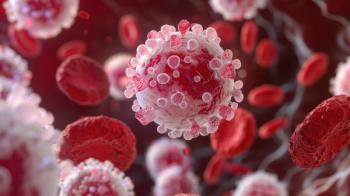
Pharmacy Practice in Focus: Health Systems
- May 2019
- Volume 8
- Issue 3
Carfilzomib Shows Potential in Myeloma
The agent should be considered for frontline use as induction therapy prior to early autologous stem cell transplant, physician says.
Carfilzomib (Kyprolis) should be considered for use in the frontline setting for high-risk patients with multiple myeloma as induction therapy prior to early autologous stem cell transplant (ASCT), said Juan P. Alderuccio, MD.
“Bortezomib [Velcade], lenalidomide [Revlimid], and dexamethasone remain the standard of care in the frontline setting for elderly patients older than 75 years or unfit patients. We usually use induction chemotherapy with lenalidomide plus dexamethasone, and we keep patients on that combination until progression of disease,” Alderuccio said.
“For patients with high-risk features, however, I believe that new proteasome inhibitors, such as carfilzomib, should be strongly considered in the frontline setting associated with an early autologous stem cell transplant in those patients,” he said.
The proteasome inhibitor carfilzomib was initially approved by the FDA in combination with dexamethasone or with lenalidomide plus dexamethasone to treat patients with relapsed/refractory disease who have received 1 to 3 lines of therapy. Carfilzomib is also approved as a single agent for patients with relapsed/refractory myeloma who have received 1 or more lines of therapy.
In October 2018, the FDA approved once-weekly dosing of carfilzomib in combination with dexamethasone for patients with relapsed/refractory disease. This approval was based on positive data from the phase 3 ARROW study, in which carfilzomib administered once weekly at 70 mg/m2 with dexamethasone led to a prolonged progression-free survival (PFS; 11.2 months; 95% CI, 8.6-13.0) compared with the standard twice-weekly schedule (7.6 months; 95% CI, 5.8-9.2) in those with relapsed/refractory disease.1
Although bortezomib, lenalidomide, and dexamethasone is a commonly used regimen in the United States for patients with newly diagnosed disease, carfilzomib has shown potential to replace bortezomib as the proteasome inhibitor of choice in this combination, based on promising phase 2 data from the ASPIRE trial.2 In terms of maintenance therapy following ASCT, headway has also been made with ixazomib (Ninlaro), as was evidenced by positive findings from the phase 3 TOURMALINE-MM3 trial, which showed that it resulted in prolonged PFS compared with the placebo.3
“I believe that ixazomib offers an opportunity for patients who are not able to tolerate lenalidomide maintenance or who don’t want to take the risk of secondary malignancies,” said Alderuccio, an assistant professor of clinical medicine at Sylvester Comprehensive Cancer Center, University of Miami Health System.
Although lenalidomide-based therapies have been the standard for patients with newly diagnosed disease who are ineligible to undergo stem cell transplantation, daratumumab (Darzalex) has also emerged as a potential option. Results from an international study presented at the 2018 American Society of Hematology Annual Meeting showed that the addition of daratumumab to lenalidomide plus dexamethasone resulted in a 44% reduction in the risk of progression or death.3
This article originally appeared on Pharmacy Times® sister publication OncLive®’s website.
REFERENCES
- Mateos M-V, Moreau P, Berenson JR, et al. Once-weekly vs twice-weekly carfilzomib (K) dosing plus dexamethasone (d) in patients with relapsed and refractory multiple myeloma (RRMM): results of the randomized phase 3 study A.R.R.O.W. J Clin Oncol. 2018;36(suppl 15; abstr 8000). doi: 10.1200/ JCO.2018.36.15_suppl.8000.
- Siegel DS, Dimopoulos MA, Ludwig H, et al. Improvement in overall survival with carfilzomib, lenalidomide, and dexamethasone in patients with relapsed or refractory multiple myeloma. J Clin Oncol. 2018;36(8):728-734. doi: 10.1200/ JCO.2017.76.5032.
- Facon T, Kumar SK, Plesner T, et al. Phase 3 randomized study of daratumum- ab plus lenalidomide and dexamethasone (D—Rd) versus lenalidomide and dexa- methasone (Rd) in patients with newly diagnosed multiple myeloma (NDMM) ineligible for transplant (MAIA). Blood. 2018;132(LBA-2). bloodjournal.org/ content/132/Suppl_1/LBA-2?sso-checked=true.
Articles in this issue
over 6 years ago
How Does a Pharmacy Train Staff to Handle HDs?over 6 years ago
Pharmacists Are Integral to Diabetes Careover 6 years ago
HIV Treatments and Guidelines Offer More Optionsover 6 years ago
SBRT Improves Options for Prostate Cancerover 6 years ago
Get PrEPared for HIV ProphylaxisNewsletter
Stay informed on drug updates, treatment guidelines, and pharmacy practice trends—subscribe to Pharmacy Times for weekly clinical insights.


























